It is sometimes amazing how an apparently trivial event or decision can change our lives forever. And this is not just true of individuals, because the story of ‘Strange Relations’ – one of the greatest bands to emerge from the US city of Minneapolis – would probably not have got started if not for a similarly trifling incident.
On 7th December 2007, two 17-year-old first semester students at Bryn Mawr College (a women-only university near Philadelphia) went to a party at the nearby co-ed Haverford College. The two universities share many resources and run an inter-campus transportation system called the ‘Blue bus’ to allow their students to move safely and easily between them. On this particular night, however, our heroines: Casey (Cassandra) Sowa and Maro (Marisa) Helgeson, missed the last bus and had to walk home. It was only a two to three-mile walk, but the area could still be dangerous at night. Thankfully, they made it back safely, but by the time they arrived the two had become friends and in the weeks that followed the friends became best friends, before friendship blossomed further into a love affair that has lasted to this day.
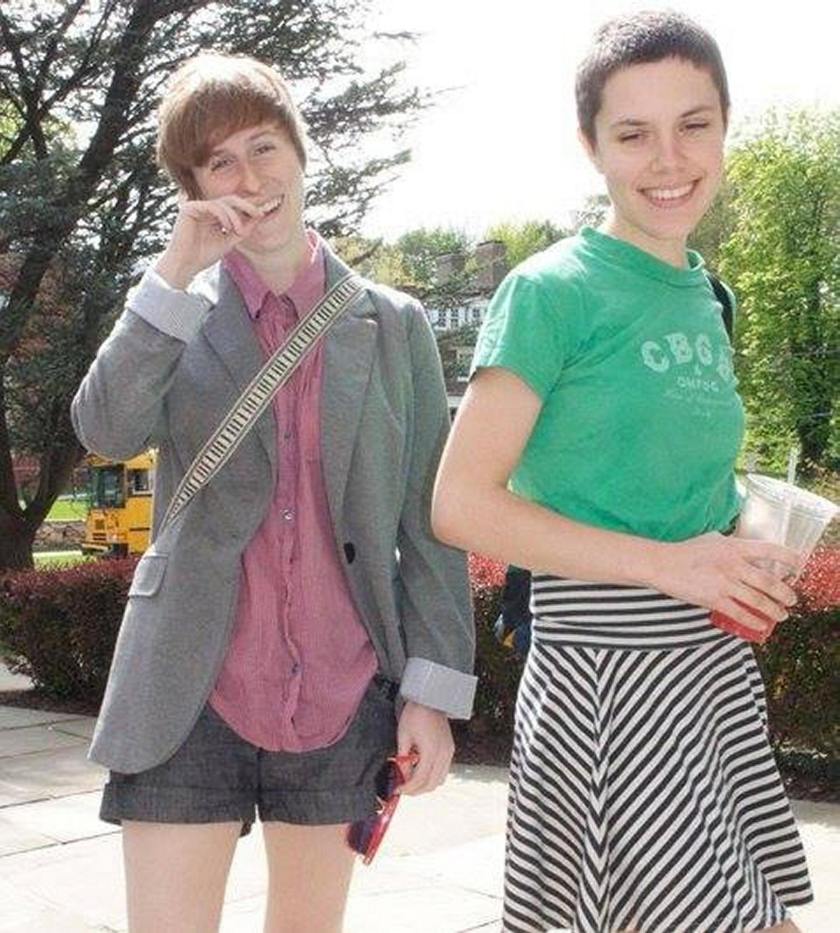
Sowa and Helgeson also bonded through music, but they were not the only budding rock stars in their Bryn Mawr year and by 2008 they had teamed up with Riki Gifford-Ferguson and a certain Michelle Zauner, to form a band called ‘Post Post‘. Zauner was lead vocals and guitar, Helgeson played keyboards, whilst Sowa and Gifford-Ferguson formed the rhythm section on drums and bass. Both Zauner and Sowa had been in bands since High School but with Gifford-Ferguson soon replaced by Haverford student Kevin O’Halloran, all four of the final line-up took their music very seriously.
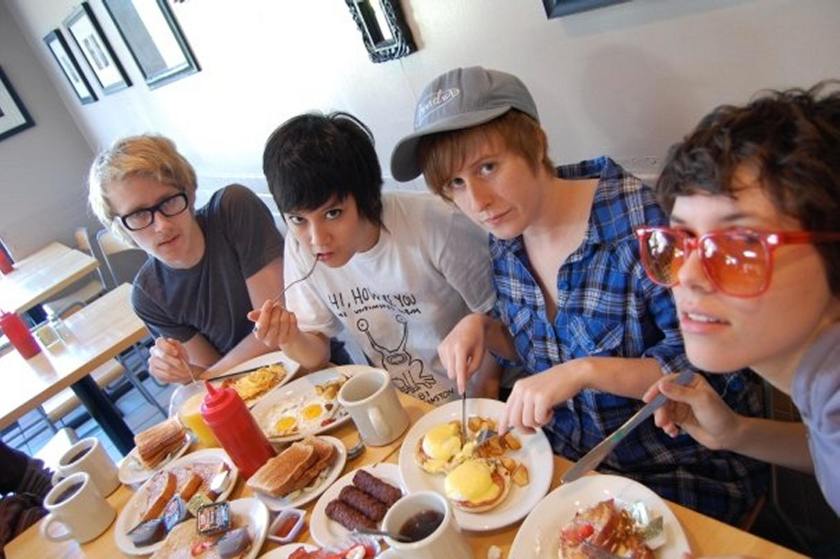
After landing in hot water when they tried to use Helgeson’s dorm room as a rehearsal space – something that did not go down well with her more studious colleagues, ‘Post Post’ soon became a well-drilled outfit. Zauner wrote their music from the start and they began to achieve a degree of success, to the point that they were soon starting to record. They would eventually release two EPs whilst still students: the five-track ‘Meta Meta’, in 2009, and the shorter, four-song, ‘Residents’ in 2010.
Miraculously, ‘Meta Meta’ is still available on-line as a free download, and is well worth a listen. I must admit that although the band members have all since gone on to achieve great things, we first played it expecting mere juvenilia – of more interest, perhaps, to fans who just have to collect everything, than to straightforward music lovers. Not a bit of it, though. The music is more poppy than anything the four have done since, but it is quality pop. It has a distinctly late 1960s London vibe to it, especially the opening track, ‘The Auction (part 2)’, with Helgeson’s keyboards, for example, having something of a ‘Nice’ era Keith Emerson feel. Only the final track, the darker and slightly longer ‘Sober’, is more in keeping with the sort of thing we might expect from the band members today. Even at this early stage, however, Sowa’s distinctive drum style is already recognisable.
‘Residents‘ has also survived on-line and continues its predecessor’s pop style, but with O’Halloran’s bass becoming more driving, whilst Zauner’s guitar has started to make more use of echo/reverb – something that remains a feature of her present-day style. Likewise, a hunt through the Internet reveals live versions of several other songs, such as ‘Stampedes’ which never made it to record.
All four ‘Post Post’ members left university in 2011, although Sowa has said that she did not graduate, and the band split down the middle, giving birth in the process to two major acts. Zauner and O’Halloran remained in Pennsylvania and formed the band ‘Little Big League’, with Zauner also becoming increasingly well known as solo artist ‘Japanese Breakfast’ (she is actually of Korean not Japanese descent). Sowa and Helgeson, on the other hand, headed west to Minnesota and the twin cities of Minneapolis and Saint Paul – an area with hard winters but a rich music scene. The couple formed their own band, ‘Strange Relations’, and by 2012 they were getting write-ups in the local press, and becoming avid gig-goers as well as givers.
Having their own project gave Sowa and Helgeson full artistic control for the first time, but it did force a major redistribution of labour. Firstly, although retaining the keyboard brief, Helgeson also took over on bass, becoming a combined bass and synth player in the manner of Lo Moon’s Crisanta Baker. The impression gained is that she learnt from scratch especially to make this transition and she initially showed elements of O’Halloran’s style in her own playing – with quick-fire but simple, often cyclic phrases. It is hardly surprising that she should be influenced by someone who had just been a bandmate for several years, but the effect should not be exaggerated, because her actual lines are very much her own. Sowa flowered even more away from Zauner’s shadow as front-woman and became the principle song-writer and lead vocalist, whilst retaining her seat at the drum kit.
Really good singer/drummers have never been thick on the ground, but there have been some great examples, perhaps most famously Phil Collins. A disproportionate number have been women, and we might cite cases from Karen Carpenter and Shelia E, to present day exponents such as Collette Williams (‘Rews’) and Etta Curry (‘Loose Tooth’). Sowa is now a leading member of this elite but her drumming and singing styles could not be more different. Her drumming can be quite aggressive, with a style which is hard to put into words but might be described as “shivering”, in that it frequently takes the form of short, but very quick-fire patterns. Her snare work can sound almost military, although she often syncopates well off the beat. Her vocals, on the other hand, tend towards a gentle, breathy soprano of almost chorister-like purity, usually treated with reverb to give a hugely spacious sound. On record, of course, the drums and vocals can be recorded separately, so there is no physical conflict between these two, but live she is perfectly capable of singing with the voice of an angel whilst beating the living daylights out of her kit – a combination which it is no mean trick to achieve.
The couple describe their genre as “Diary Rock”, partly to reject the term “confessional”, which Sowa has said: “has been used in a disparaging way to describe women songwriters for so long [that] me using ‘diary rock’ to describe our sound is my way of expressing a reclamation of the confessional. I see it as a feminist descriptor.”
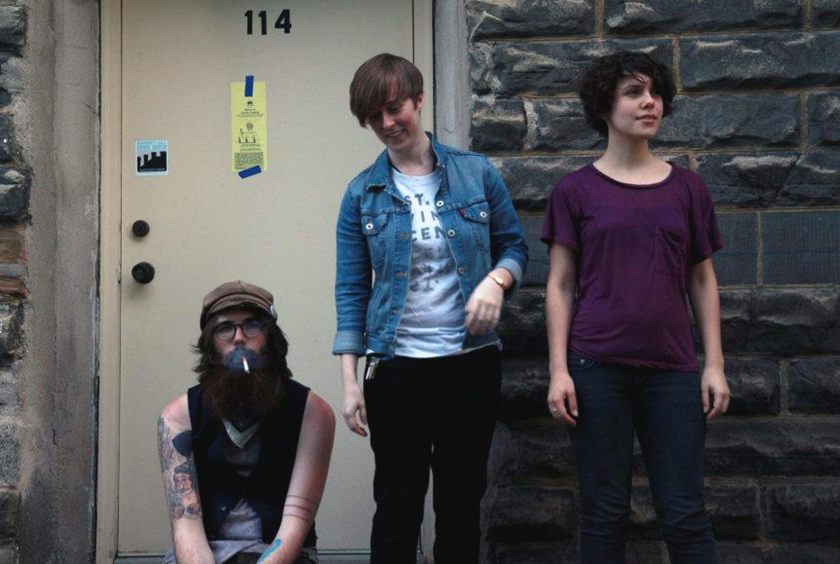
By 2012, Sowa and Helgeson had teamed up with guitarist Andrew ‘Theramu’ Shaw to turn ‘Strange Relations’ into a three-piece – and set about making their first record: the six-track EP ‘Ghost World‘, which was self-released as a download and pre-recorded cassette. Photographs of the band at this time show Shaw heavily bearded, with hair reaching below his shoulders and numerous arm tattoos. His style fitted the band well. He played echoey, often cycling riffs, which perfectly complimented Sowa’s tender, reverb-heavy vocals. On darker tracks, like ‘Endurance‘, his performance could become positively dystopian – an impression accentuated, not lessened, by Sowa’s wistful voice. But on brighter songs such as ‘Better than Well‘, things are the other way round, with the guitar helping to highlight the gentleness of the singing.
As well as showcasing Sowa’s voice, ‘Ghost World’ also saw her debut as a lyric writer and thus revealed a genuine musical poet with a wonderful – if sometimes obscure – way with words. The title track, for example, is about a photograph of a girl from Sowa’s High School journal. Whether she was a friend, or possibly even a lover is not specified, but the song yearns for the time when the girl in the picture was the reality, not just a frozen memory – or as the lyrics put it:
“I wanna light a match and split this window open
try to reclaim you from your ghost world, but you belong there
and this girl might smile like you and lean like you, but she is not you
She’s just some silver dust and shadow.”
The highlight of the EP, however, is its final track, ‘Or Telepathy‘ – a truly beautiful love song, presumably directed at Helgeson. This is Casey Sowa, though, so don’t expect lyrics in the “She loves you yeah, yeah” mould. Instead, we get – in her softest, most lingering voice:
“Consider me your own, a favourite track someone else wrote.
Am I safe in your care? Am I safe in your care?
Do you still crave my flesh like you did when we first met?
Can you still absorb me in a fit of osmosis – or telepathy?”
‘Ghost World’ was Shaw’s only record outing with ‘Strange Relations’ before he was replaced by Nate Hart-Andersen, who, unlike his predecessor, was credited as a full member on record sleeves. He is a Twin Cities local (but somehow an avid Tottenham Hotspur fan) with a thinner, more subtle, Telecaster guitar sound that makes more use of chords and (occasionally phased) distortion. The cyclic, echoey riffs are still there (e.g. on ‘Parallel‘), but he can also be an out-and-out shredder as, for example, on ‘Very White Teeth‘ from the band’s debut, full-length album ‘-Centrism’.
‘-Centrism‘ appeared almost exactly two years after ‘Ghost World’, in March 2015, and was another download and cassette release. Sowa has said that it was inspired by one of her favourite films, ‘Water Lilies’, by Celine Sciamma and, with a few exceptions, it has a lighter (if perhaps more disciplined) touch than its predecessor, although Helgeson’s bass style has become more driving and more truly her own. Her lines are often simple, yet highly effective. For example, the bass part for the whole of ‘Very White Teeth‘ consists of just four endlessly repeating notes. Likewise, the opening track, ‘Underage‘, features rapid fire sequences of just two to three notes played repeatedly, usually on a rising scale, and her bass parts can be great practice exercises for budding bassists to try and copy. That said, the album also features more complex bass playing, as, for example, on ‘You Talk‘.
Sowa’s voice is, if anything, even more airy this time round – for example in the beautifully wistful ‘Distraction‘ – although she also manages to mix tranquillity with power with increasing success, as on ‘Underage‘. Somewhat against the prevailing mood of the album there is one out-and-out punk song with ‘Panther’s Conquest‘, and Sowa makes a brave attempt at a punk voice to go with it. But although that may not be a complete triumph, the instrumental parts are glorious, as are the lyrics, which include the lines:
“I have infinite fathers and none of them are chosen
Can’t walk down the street till I master my gag reflex.”
Another experimental genre change on the album, ‘Lylas‘, is vocally more successful. It comes close to a reggae rhythm in places, but with more straightforwardly rock sections elsewhere, and it allows Sowa’s voice to shine to best advantage, with a dynamic range that stretches from classic power ballad to a breathy, almost purring tone.
The album shows a general trend towards increased musical complexity. For example, ‘The Pull‘, or ‘Uprooted‘, with the latter, despite being under four minutes long, falling into sections which resemble the movements of a small symphony. It shows all three band members at their best, and further showcases Sowa’s growing vocal confidence as she again successfully throttles up from her softest, most angelic croon at the opening, to a full-power-on finale.

The stand-out track, though, is ‘Very White Teeth‘, which appeared as a single a full year before the album – in March 2014 (and has nothing whatever to do with teeth). The guitar ranges from a gently cycling opening riff to out-and-out shredding. A repetitive, on-the-beat bass line perfectly complements hugely syncopated drumming, all of which backs Sowa’s voice at its yearning best. Then suddenly the whole thing stops to make way for a slightly sinister outro made up of a full 40 seconds of pulsating synth sustain. Even with this section, the song is barely over three minutes long, but it is a genuine masterpiece in miniature.
Throughout the album the poetry of Sowa’s lyric writing remains enchanting, with hesitant love song ‘You Talk’, for example, ending:
“You talk a perfect vision, the kind I’d give anything to invest in.
Could you forgive my past indiscretions for a votive altar in your name ?
or a kiss ?”
whilst the chorus of another of her bittersweet, reluctant love songs, ‘Lylas’ runs,
“Chasing down a tidal wave, running on fumes again.
I used to not know your name. I used to not feel your gaze.
We cut our palms, made our blood vows and there’s no turning back now.”
If ‘-Centrism’ was Strange Relation’s most experimental record so far – with its flirtations with multiple genres – their next release, the four song EP ‘Going Out‘ was the most stylistically consistent – although it was also the shortest, at just 14 and a half minutes. It appeared in 2016, by which time the band had joined the ‘Tiny Engines’ label rather than self releasing, but again it was only available as a download or cassette, with no CD version. It represents something of a return to the feel of ‘Ghost World’ three years before, with tracks such as ‘Drift‘ featuring more echoey guitar and fewer strummed chords. For much of the time Sowa’s vocals are back in gentle, reverb-heavy, chorister mode, and only Helgeson’s more driving bass style retains more of a ‘-Centrism’ feel. That said, the record represents a significant advance on ‘Ghost World’. For example, the second track, ‘Ceremonies‘, is a real gem and remains perhaps the bands best known song. It deals with the tendency for even our escapes, like going out, to become mere rituals that cease to satisfy or, as its recurring refrain puts it: “It feels like I can’t feel enough anymore”. The gloriously muddy guitar and down-played bass and drums form a perfect backdrop to a vocal line that somehow conspires to make utter gentleness sound ominous. This is a paradox that Sowa has used to great effect several times since, not least on the next track on the EP, the deeply sinister ‘Predation‘, which also features an eerie vocal echo of the opening of LedZeppelin’s ‘Immigrant Song’, whilst further showcasing Helgeson’s rapidly improving bass work.
Lyrically, ‘Going Out’ shows a greater cynicism that its predecessors. There is no ‘Or Telepathy’ this time round, or even the more tentative love songs seen previously. Instead our lives (or Sowa’s at least) are sometimes made to appear all but futile, and in the final track, ‘Weeknites‘, she doubts whether we can ever really know anyone, or even ourselves, whilst the instrumental backing – including a rapid-fire looped bass line – crackles with a restless, almost neurotic energy. Nevertheless, despite the darker mood, this is a wonderful record, and the atmosphere is lifted at the end of at least some download versions by a bonus track cover of ESG’s ‘My Love For You‘.

Apart from a single, ‘Maria Sweet‘ – which was recorded as part of music blog ‘The Grey Estates’ compilation album ‘Sugar Rush 2’, released in March, 2017 – the next ‘Strange Relations’ record was their second full album, ‘Editorial You‘, which appeared in September the same year. As usual, the artwork was hand drawn by Helgeson, but this time there was a vinyl version joining the by now traditional download and cassette (but still no CD) and the much larger format of a 12″ LP sleeve allowed her work to be seen to much greater advantage. The physical versions also carry an extra bonus track, ‘Win’ which is not available digitally.
Up to this time, the band had followed a steady upward trajectory, with each release being noticeably better than the last. ‘Editorial You’, however, although five minutes shorter than ‘-Centrism’, was a quantum leap forward that took an already superb band into the ranks of true greatness. It is a genuine masterwork from its opening moment: a sharp intake of breath before Sowa starts to sing opening track ‘Evidence‘. It is also something of a concept album.
As Sowa herself has said: “One idea I really wanted to explore throughout the record was this pressure to be or become desirable in order to fulfil one’s own desires.” It is at least partly about bodies and danger, and this is nowhere more true than on ‘Flight Instinct‘, which is not only the stand-out track on the record, but one of the most emotionally powerful songs of recent years. It deals with the subject of rape, and the effect that the mere fear of attack can have in curtailing a woman’s sense of freedom. ‘Strange Relations’ are not the only artists to approach the subject recently. Courtney Barnett’s ‘Nameless Faceless‘, released just six months later, is another hugely powerful example. But while Barnett’s anger is palpable, ‘Flight Instinct’ shows ‘Strange Relations’ at their most caressingly delicate. Sowa’s drumming is a heartbeat underlying pulsing bass and soft but nervy guitar. Her voice, though, verges on the terrifying – and this is because, not in spite of, being at its most wispy. The repeated refrain (and rapist cliché) “This would be easier if you don’t struggle” is somehow far more disturbing when sung in the voice of an angel than it would have been as a scream. Likewise, the verse:
“Every time I go out, wonder how I’ll get home
Feel that sickly prickle, walk a little faster
………………………….
If I am lucky now, will I be lucky next time?“
rendered in a sugar-sweet near whisper, becomes positively eerie. It is one of those “hair standing up on the back of the neck” moments that mark the very best in both music and poetry.
The album showed that all three had matured considerably – Helgeson’s bass work especially. She began, not surprisingly, as a keyboard player for whom bass was simply an add-on skill. Her lines often remain quite simple, as in ‘Orbit‘, but she was now a fully fledged bassist (without losing anything as a keyboardist), capable of considerable innovation, as in tracks such as ‘NBE‘ and ‘Sure‘. Hart-Andersen’s guitar and Sowa’s drumming had become noticeably more nuanced, while Sowa’s vocal control had improved yet further. A superb example of the latter is ‘Lin‘ – another of the album’s strongest tracks – for much of which her voice is almost seductive, before suddenly turning piercing for a single syllable and then returning to the caressing tone. Meanwhile, the instrumental parts had become almost classical in scope – the most glorious example being ‘Spit‘, a majestic four and a half minute symphonic gem whose entire vocal part consists only of the lines:
“You’re nothing but a life-size cardboard cut-out
someone breathed life into on accident
and spit away the sadness.“
Yet if ‘Editorial You’ was the supreme achievement of the Sowa/Helgeson/Hart-Andersen line-up, it was also its swan-song, because on 9th May 2017, when the album had been recorded but not yet released, the band announced on Facebook that “Nate will be parting ways with SR in order to focus on other goals and journeys.” Hart-Andersen’s guitar had been fundamental to their sound, but then so, once, was Michelle Zauner’s and if she could be replaced than anyone could. It should, thus, have been just a matter of finding another compatible guitarist. Yet Sowa and Helgeson seem to have made a conscious decision that henceforth ‘Strange Relations’ would remain a two piece.
In fairness, this was not an entirely new departure, for they had produced a number of songs previously under the ‘Strange Relations’ banner, but which only featured the two of them. For example, there is one called ‘Glaciers‘ on ‘Bandcamp’, which dates to August 2013, shortly after the release of ‘Ghost World’. It is classified as a demo, and it is possible that it was originally expected to acquire a guitar part. Yet it seems perfectly complete as it stands, even though the backing also lacks bass guitar and consists wholly of drums and keyboards. On ‘Ghost World’ itself ‘Or Telepathy‘ is also recorded with just drums and keyboards. Then there was 2017’s ‘Maria Sweet‘, which again lacks guitar, but instead brings the bass more to the fore, with Helgeson starting to use distortion and other effects. These have since become an increasing part of her playing, as the bass in the band’s new two-piece incarnation has had to acquire a good deal more versatility, to carry more of the load. She has thus acquired quite a pedal board, which reaches well beyond the standard bassists’ armoury of compressor, tuner and little else. She was, after all, a synth player in origin, to whom electronic effects and signal processing are nothing new, so it should come as no surprise to see her pushing the bass envelope. Finally, the bonus song, ‘Win’, on the analogue versions of ‘Editorial You’ is also a two-piece track on an otherwise three piece album.
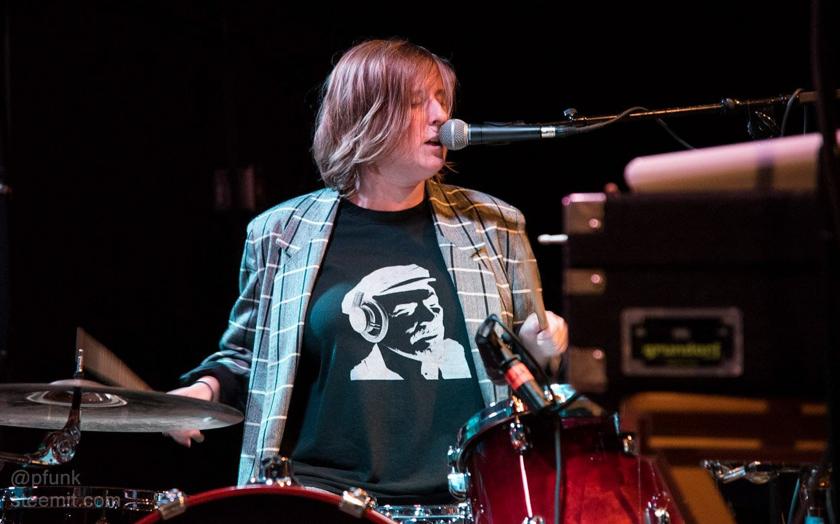
For a band who are also a couple (and their own managers) to sail their ship so entirely alone, obviously gives them unprecedented control and the ability to shape their art without needing to compromise or take on board anyone else’s views. Nevertheless, to convert a band with such a distinctive sound into a guitar-free zone is an extremely bold step, and one or two videos of them playing live in the second half of 2017 (e.g.) were not greeted with unalloyed enthusiasm by fans. Nevertheless, they have gradually been working themselves better into their new configuration, and have even successfully adapted songs from the Hart-Andersen era to work with just bass and drums. The first example to really show what was possible was a live performance of a dramatically rearranged ‘Lin‘, from ‘Editorial You’, which appeared on YouTube in November 2017, and things have continued to evolve since, with more pedal effects on the bass.
The band’s Facebook page showed them in the studio to record new material in the spring of 2018 – with Sowa recording on her 28th birthday, when she received 28 tulips from Helgeson to mark the occasion. To date, the band have alternated EPs and albums, and they confirmed in a recent interview that the new material was intended for an EP, which would certainly be a safer way of testing the water for the new sound. No release date has yet been announced, but apparently the sessions also marked their first foray into recording on analogue equipment. Undeniably, the pair are taking a risk, but there are some extremely effective two piece bands around at present, not least ‘Rews‘, ‘Sit Down‘ and ‘Let’s Eat Grandma‘, so we will eagerly await the new record to see if Sowa and Helgeson have pulled it off. Certainly, a live recording of an as yet unnamed song, which reached YouTube just days before this article was written in August 2018 does give reason for hope – even for dyed in the wool guitar lovers like ourselves – especially as the sound could be further filled out by overdubs in the studio. After all, another superb two piece, ‘Kite Base‘, consists of just two bass players and a drum machine (called Oscar) – and they are quite simply breathtaking.
Update 29-10-2018.
October 2018 saw the band’s first record release since becoming a two piece: a 13 minute three track EP named after it’s opening track ‘Sideline Kid‘, available as a download only. The feel of the music without Hart-Andersen’s very distinctive guitar style was obviously always going to be very different, but that is no criticism. There is still guitar, now played by Sowa. It is just sparser and much more gentle. Indeed gentleness is very much a watchword of the EP. There is more synth and the absence of hard edged guitar, leaves space for more frequent and often beautiful vocal harmonies – frequently heavily echoed. Perhaps the most stand out feature, however, is the way that Helgeson’s bass has come more to the fore and moved into territory formerly occupied by Hart-Andersen, especially on the second track, ‘Touch/Keep‘ which is rather more up tempo than the others. Some will no doubt miss the old sound, but even they should be able to accept that the EP shows that the band are evolving in an interesting and productive direction, albeit a more traditional four tracks would have been welcome.

Sowa’s delicate voice has always been one of the most alluring features of the ‘Strange Relations’ sound and again the absence of harsh guitar sounds on ‘Sideline Kid’ allows her to dominate even more, and with the lyrics coming through clearer (albeit for anyone who still cannot make them out they can be downloaded from the band’s ‘Bandcamp’ page). The lyrical content is distinctly bittersweet, in keeping with the overall musical feel, with a recurring theme of relationship dysfunction or break-up. The crowning glory here is the closing track, ‘All together‘ which is simply exquisite and features just Sowa’s voice and Helgeson’s bass, with the latter double tracked to provide two separate parts, with no guitar, keyboards or percussion. It is a classic demonstration that less really can be more, and is the most beautiful thing they have done since ‘Or Telepathy’.
Update 19-7-2021.
The release of a single, ‘Dream of Four’, in late 2020 gave hints of the way ‘Strange Relations’
might progress beyond ‘Sideline Kid’. But it was not until ‘Belonging’ in April 2021 that we first had an opportunity to hear the new two-piece incarnation over a full length album. The single featured darkly repetitive bass, overlain by wispy vocals to give a sinister, sweet and sour juxtaposition, rather like that used so effectively in 2017’s ‘Flight Instinct’. That song too saw minimal guitar for much of the
time, although the dark atmosphere was softened by keyboards. There was no such sugar-coating on ‘Dream of Four’, however. There, the relentless bass was much higher in the mix, with distortion giving a still more threatening atmosphere. This was complimented by vocal screams which, when added to multiple repetitions of a spookily spoken “Breathe in, breathe out” at the end, gave the song a distinct air of menace.
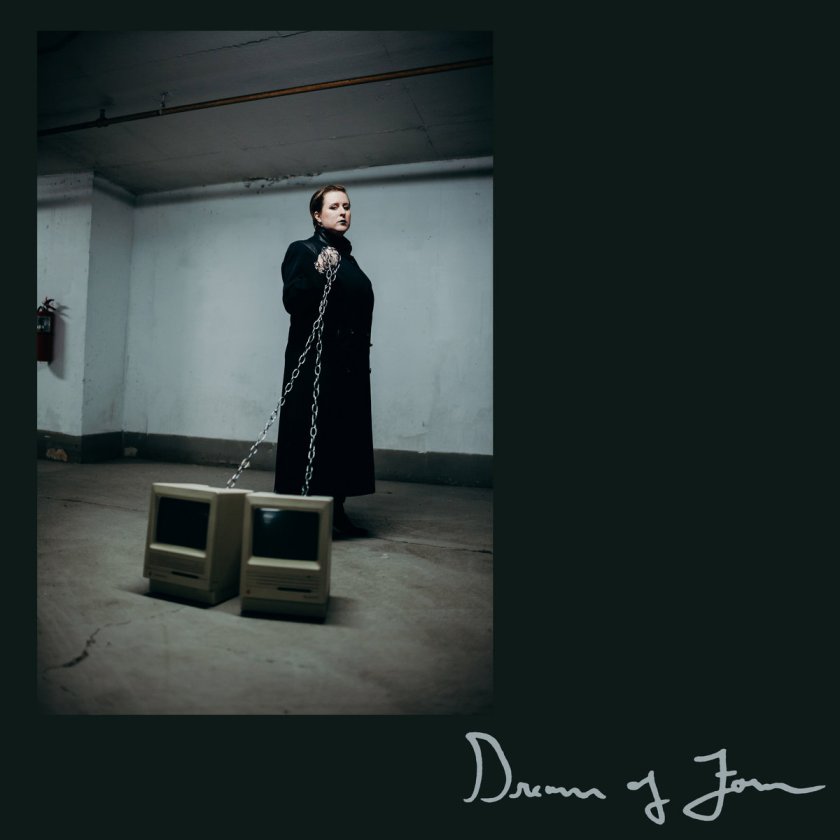
The ‘Dream of Four cover.
‘Belonging’ (available as a download or cassette) continues so seamlessly from ‘Dream of Four’ that it is perhaps a shame the single wasn’t included. It would have fitted well and lengthened a fairly short album (of twelve tracks in 30:58) by almost another three minutes. That is one of the only small faults I would find though: the other being the lack of published lyrics.
Fans will, no doubt, differ over the new sound. Some will yearn for the return of the guitar. Others might prefer the new approach. I happen to like both, but make no mistake; you can’t expect ‘Belonging’ to be just another ‘Editorial You’. Sonically, they are almost different bands. But the important thing is that they are almost different great bands.
‘Belonging’ continues to see ‘Strange Relations’ taking a stripped down, minimalist approach, much more dominated by the bass than previously. Helgeson has always favoured relatively simple bass lines in the past and for the most part she continues to do so here. For example, ‘Ready to be Happy’ sees her playing the same note again and again in rapid succession for the whole of the first thirty seconds. However, as with the single, the bass tends be much higher in the mix, with often cyclic, almost hypnotic, yet driving riffs which can dominate songs like ‘Surrender’ in the way that guitar riffs might with another band.
And not all is simplicity. We get occasional touches of bass harmony, as in ‘Keven Wailey’, where the
bass is often the only instrument playing. Sowa’s drumming, meanwhile is often wildly syncopated, for example at the start of ‘Good Time Baby’.
Again like ‘Dream of Four’, the stark atmosphere is rarely softened with keyboards. That said, the absence isn’t total. The album opens with a gentle thirty seconds of piano, and towards the end there is a one minute piano and clarinet instrumental called ‘Moon Sign’. But the only actual song that involves keyboards is the closing track, ‘Sixteen’, where they have something of a tremolo-heavy ‘Pink Floyd’ feel.
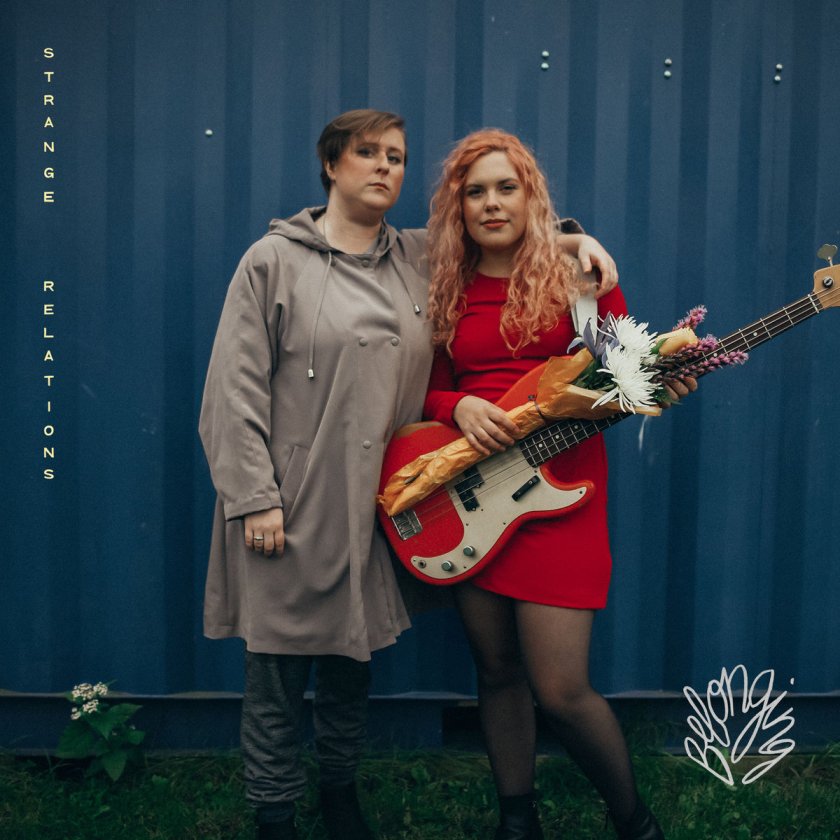
The ‘Belonging’ cover.
At times the instruments almost become additional voices, winding round the actual vocals, mixed with other sounds such as hand claps, as in ‘Blisters’, and this is particularly true of ‘Tigers’ where the Spartan bass-and-drum-only regime is relaxed to admit a cello and clarinet.
A great gainer from the less cluttered, more open and spacious acoustic is the vocals. Sowa has always been notable for her ability to combine heavy instrumental backings, with an almost angelically soft, yearning vocal quality, and this remains much on display here. But she also manages to show a greater range and flexibility. Her voice is distorted on occasions to take on a more powerful tone, as in ‘Reaching’. Elsewhere, multi-tracking gives her an almost Bananarama feel, as with ‘Good Time Baby’. There are also more complex harmonies, between the two band members, which are well brought out by good overall recording quality. That said, the yearning tone acquires a hard edge on occasions, as on ‘Take me Back’. But then Sowa always could menace as well as sooth. In fact her very vocal sweetness can seem disturbing at times.
‘Belonging’ shows that rare thing: a band who are also a couple, evolving and experimenting. There are times when the music almost becomes abstract, such as the opening of ‘Reaching’, but the experimentation is always to the point. It’s never self indulgent or unmusical. You may like the way the band are going; or you may not. I do. But don’t expect it to be quite as immediately accessible as the band’s previous albums. It does take a few listens to really get it. It’s worth it, though.
Hera Says.
Hera wishes to thank Casy Sowa for her help during the research for this piece.
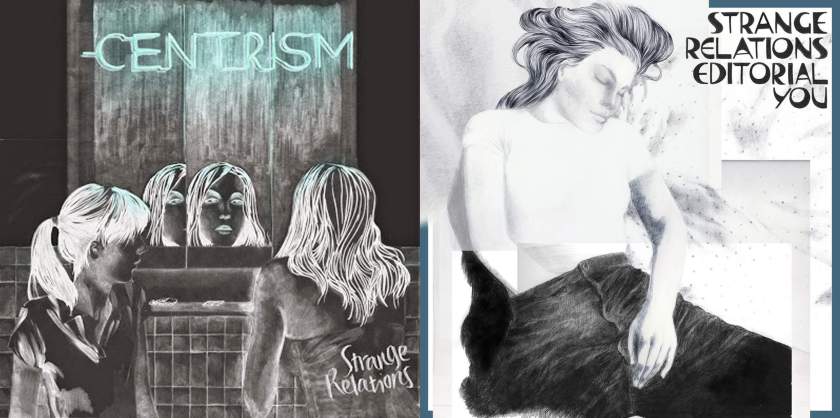
Feature image: by Katie Essick
‘Hera Says’ also has a Facebook page at: https://www.facebook.com/hera.saysso.3


